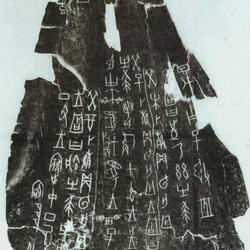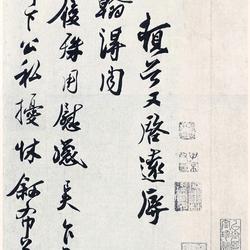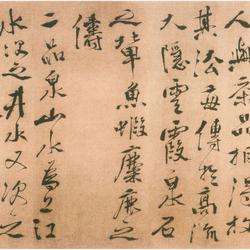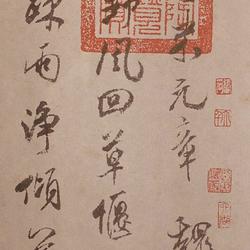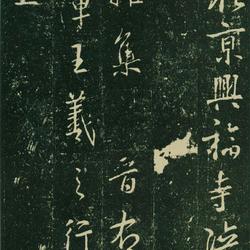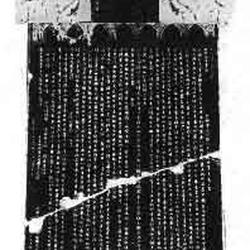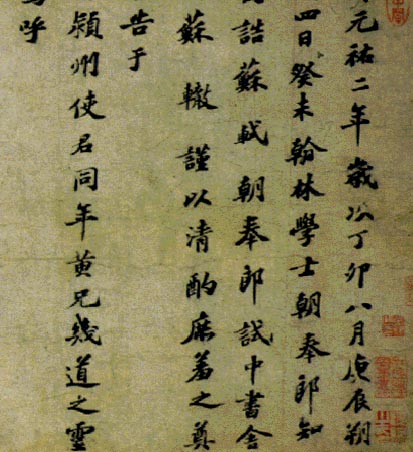
"Jidao Wenjuan", regular script, 31.6cm in length and 121.7cm in width. 1087. Collection of Shanghai Museum. In June of the eighth year of Yuanfeng, Su Shi was recalled to Bianjing to return to the imperial court to serve as Lang Lang. Later, he was promoted to Hanlin Shi to study as a bachelor and the Minister of Rites, which caused great changes in Dongpo's life and political treatment. This is a tribute he wrote for the death of a good friend. Su Shi was fifty-two years old at the time. His calligraphy style was quaint, elegant, frank and natural. It is one of the rare regular script treasures among Su Shi's handed down works and has always been praised.
Huang Haoqian, also known as Jidao, entered the official career in June of the third year of Xining (1070), the reign of Emperor Shen of the Northern Song Dynasty. Lang was a doctor in the driving department. In the second year of Yuanyou, he was appointed as the magistrate of Yingzhou. He died in April or May of that year before he took office. Because his last position before his death was the magistrate of Yingzhou, he was also called Huang Yingzhou.
Lou Yao from the Song Dynasty wrote "Gong Wei Collection". In Volume 73, there is an article "Two Postscripts of Dongpo Valley Collected by the Huang Family" which states: "The father and son of Dongpo and Huang Yingzhou are very kind, and they have tasted the writings of Yingzhou." After the father and son thought about the collection of poems, the two daughters of Longtu were the wives of the second son of Shaogong. Looking at the article dedicated to Yingzhou and the letters of Longtu and Zhige, we can know that they were in love." The Huangyingzhou mentioned in the article refers to It is Huang Haoqian, and Long Tu is Huang Haoqian's son Huang Shi. According to Shi's annotation (annotated by Shi Yuanzhi and Shi Su's father and son in the Song Dynasty) "Send Master Huang to Two Zhejiang Xians" in Volume 36 of "Su Shi's Collection of Poems", "Huang Shi was a Jinshi at the time of Shenzong, and was a subordinate of Lishu ...The master is Zhang Zihou's nephew, and his son was raised by the official, so the two daughters are both sons and daughters-in-law...In the end, Baowen Pavilion was waiting for the establishment, and he knew Dingzhou, and he was given as a direct bachelor of Longtuge." About Huang and Su The relationship between the children and the in-laws is also recorded in the Qing Dynasty scholar Wang Shizhen's "Xiangzu Notes": "Master Huang is Zhang Dun's nephew, and he is the son of his second wife Yingbin (Su Zhe's name is Yingbin Yilao)." Based on the above materials, it can be seen that Su Shi, Su Che and Huang Jidao were awarded Jinshi in the same year, and Huang Jidao's son Huang Shi married his two daughters to Su Che's two sons respectively, which shows the relationship between the two families. They were quite close friends, and because of this, after Huang Jidao passed away, the Su brothers jointly wrote a memorial tribute to their good friend of the same year.
The Commercial Press of Taiwan has published Wenyuange's "Sikuquanshu", which contains a collection of "Qingrong Jushiji" written by Yuan Jue of the Yuan Dynasty. The forty-seventh volume of "Postscripts of Su Wenzhong and Huang Shishi" is as follows Records: "Master Huang is a native of Xianpu City. His father, the Lord of Yingzhou Prefecture, was very humble. He was a Jinshi in the same year as Er Su Gong, so the master was connected with Su Gong's family... Jue heard the elder's words, and his family kept it There are dozens of pieces of paper from Ersu Gong's post, and they have all been scattered in the fifth generation. This post was written by Wen Zhong after the death of his mother Zhang Shuo. I also saw the stone version in the past, but now I have found the original, and I am deeply aware of it. I feel so grateful." Unfortunately, after years of changes in the world, the only remaining piece of Ersu's handwriting collected by the Huang family is this "Ji Dao Wen in Honor of Huang" scroll.

